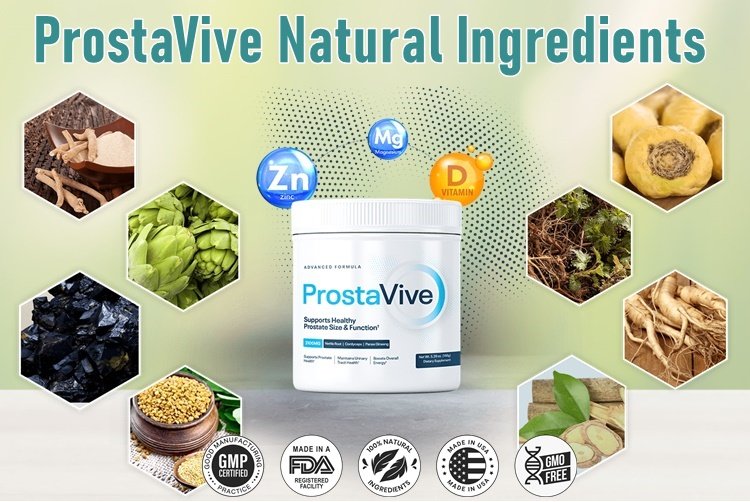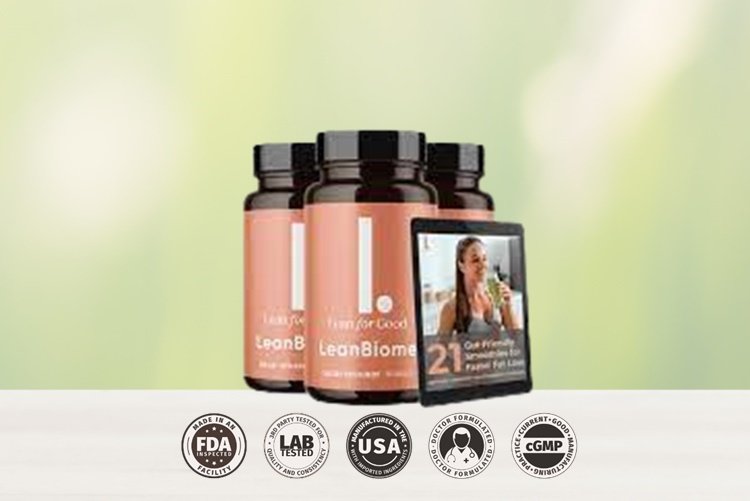ProstaVive Ingredients – Maintaining a healthy prostate is essential for men, especially as they age. Prostate-related issues like frequent urination, urinary retention, and discomfort are common problems that many men face, particularly as they reach middle age and beyond. ProstaVive is a popular dietary supplement designed to help alleviate these symptoms and support long-term prostate health.

This article provides a detailed look at the ingredients in ProstaVive, their benefits, and the science behind their use in the supplement. We will explore how these natural components support prostate health, enhance urinary function, and promote overall well-being.
What is ProstaVive?
ProstaVive is a dietary supplement formulated to support healthy prostate function, promote better urinary health, and reduce symptoms associated with benign prostatic hyperplasia (BPH). BPH is a condition where the prostate gland becomes enlarged, which can lead to difficulties with urination, including frequent urges to urinate, especially at night. ProstaVive combines a range of natural ingredients that are known for their potential to improve prostate health.
The supplement is designed to be an all-natural alternative to prescription drugs, offering men a way to manage their prostate health through the power of herbal ingredients, vitamins, and minerals. In this article, we will break down the key ingredients of ProstaVive, explain their benefits, and review the scientific studies that back their effectiveness.
ProstaVive Key Ingredients and Their Benefits
ProstaVive contains a carefully selected blend of natural ingredients that are known for their prostate-supporting benefits. Below, we will dive deep into these ingredients, highlighting their specific functions and how they contribute to prostate health.
Saw Palmetto Extract
What It Is:
Saw palmetto (Serenoa repens) is a small palm tree native to North America, and its berries have been used for centuries to promote prostate health. Saw palmetto extract is one of the most commonly used herbal remedies for benign prostatic hyperplasia (BPH).
How It Works:
Saw palmetto works by inhibiting the enzyme 5-alpha-reductase, which converts testosterone into dihydrotestosterone (DHT). DHT is a hormone that can lead to prostate enlargement, and by reducing DHT levels, saw palmetto helps prevent and manage the symptoms of BPH. Saw palmetto also has anti-inflammatory effects, which further benefit prostate health by reducing swelling and discomfort in the prostate gland.
Scientific Evidence:
Numerous clinical studies support the effectiveness of saw palmetto in improving prostate health. For instance, a 2006 review published in the Journal of Urology found that palmetto significantly improved urinary symptoms and flow in men with BPH. Another study published in BJU International confirmed that saw palmetto extract was as effective as pharmaceutical medications for reducing urinary symptoms caused by prostate enlargement.
Beta-Sitosterol
What It Is:
Beta-sitosterol is a plant-derived sterol found in various plants, including saw palmetto, pumpkin seeds, and soybeans. It is known for its ability to support prostate health by reducing inflammation and improving urinary function.
How It Works:
Beta-sitosterol works by blocking the action of certain enzymes that contribute to the enlargement of the prostate. It also helps reduce the frequency of urination, particularly at night, by improving urine flow and reducing the symptoms associated with BPH. Additionally, beta-sitosterol has been shown to reduce inflammation in the prostate, further supporting healthy prostate function.
Scientific Evidence:
A study published in the Journal of Urology found that beta-sitosterol significantly improved urinary symptoms and flow in men with BPH. Another study in The Lancet showed that beta-sitosterol supplementation led to a reduction in prostate size and improved urinary symptoms in men with BPH.
Pumpkin Seed Extract
What It Is:
Pumpkin seeds are rich in essential vitamins, minerals, and antioxidants. The seeds have long been used in traditional medicine to support prostate health.
How It Works:
Pumpkin seed extract is known for its high zinc content, a mineral that is vital for maintaining prostate health. Zinc helps regulate the activity of enzymes and hormones that affect prostate function and size. The extract also contains phytosterols, which can help reduce the symptoms of BPH and improve urinary function by promoting proper bladder health and urine flow.
Scientific Evidence:
Research published in The Journal of Medicinal Food found that pumpkin seed extract improved symptoms of BPH, including urinary frequency and flow. A study in The Journal of Clinical Nutrition found that higher pumpkin seed oil intake was associated with reduced prostate volume, suggesting a potential role in preventing prostate enlargement.
Pygeum Africanum Bark Extract
What It Is:
Pygeum Africanum is an evergreen tree native to Africa, and its bark has been used for centuries to treat urinary issues and support prostate health.
How It Works:
Pygeum Africanum extract works by reducing inflammation and promoting healthy urine flow. It also has diuretic properties, which help reduce the frequency of urination, especially at night. By improving blood circulation to the prostate, pygeum can help support prostate health and alleviate symptoms of BPH.
Scientific Evidence:
Several studies support the use of pygeum africanum for prostate health. A clinical trial published in Phytotherapy Research found that pygeum extract significantly improved urinary symptoms, including nocturia (nighttime urination), and increased urine flow in men with BPH. Another study in Urology showed that pygeum Africanum was effective in reducing prostate enlargement and improving overall prostate function.
Nettle Root Extract
What It Is:
Nettle (Urtica dioica) is a well-known plant used in traditional medicine for various ailments. Nettle root extract is particularly useful for supporting prostate health.
How It Works:
Nettle root works by blocking the action of aromatase, an enzyme that can contribute to an imbalance of hormones, leading to prostate enlargement. Nettle also helps reduce inflammation in the prostate, which can alleviate symptoms of BPH, including frequent urination. Additionally, nettle root has been shown to improve urinary flow and reduce the frequency of nighttime trips to the bathroom.
Scientific Evidence:
A study published in the Journal of Herbal Pharmacotherapy found that nettle root extract was effective in reducing the symptoms of BPH, including improved urinary flow and decreased prostate volume. Another study in Phytotherapy Research concluded that nettle root extract significantly improved urinary symptoms and helped prevent further prostate enlargement.
Lycopene
What It Is:
Lycopene is a potent antioxidant found in tomatoes, watermelon, and other red fruits. It is widely recognized for its cancer-fighting properties, especially for prostate cancer.
How It Works:
Lycopene works by neutralizing free radicals, which can cause oxidative damage to prostate cells. This oxidative stress is believed to contribute to prostate enlargement and cancer. By reducing oxidative damage, lycopene helps protect the prostate and promotes overall prostate health. Lycopene also has anti-inflammatory effects, further supporting prostate function and reducing the risk of prostate issues.
Scientific Evidence:
Numerous studies have linked lycopene to a reduced risk of prostate cancer. A study in The American Journal of Clinical Nutrition found that high levels of lycopene intake were associated with a lower risk of prostate cancer. Another study published in Cancer Epidemiology, Biomarkers & Prevention showed that lycopene could slow the progression of prostate enlargement and improve prostate health in men.
Zinc – ProstaVive Ingredients
What It Is:
Zinc is vital for immune function, protein synthesis, and cellular growth. It plays a crucial role in maintaining prostate health.
How It Works:
Zinc supports prostate health by regulating enzyme activity that influences prostate size and function. It also has anti-inflammatory properties, helping reduce swelling and discomfort in the prostate. Zinc is essential for the production of testosterone and for maintaining proper hormonal balance, both of which are critical for healthy prostate function.
Scientific Evidence:
A study published in Prostate Cancer and Prostatic Diseases found that zinc supplementation could help reduce prostate size and improve urinary symptoms in men with BPH. Another study in The Journal of Nutrition concluded that higher zinc intake was linked to a lower risk of prostate cancer, further highlighting the mineral’s importance for prostate health.
=> Get ProstaVive With Special Discount From Official Website!
Benefits of ProstaVive
ProstaVive offers numerous benefits for men looking to improve their prostate health and reduce the symptoms of BPH. These benefits include:
- Reduced Symptoms of BPH: The ingredients in ProstaVive, including saw palmetto, beta-sitosterol, and pygeum Africanum, have been shown to reduce symptoms such as frequent urination, weak urine flow, and nighttime urination.
- Improved Urinary Function: Ingredients like pumpkin seed extract and nettle root help improve urinary flow and reduce urgency, promoting better bladder health and less frequent nighttime trips to the bathroom.
- Enhanced Prostate Health: Lycopene and zinc provide antioxidant and anti-inflammatory support to protect the prostate from oxidative stress while supporting overall prostate function.
- Hormonal Balance: Ingredients like zinc and nettle root help regulate hormone levels, supporting healthy prostate growth and reducing the risk of BPH.
Conclusion: ProstaVive Ingredients Effective for Prostate Health?
Based on the scientific evidence supporting the ingredients in ProstaVive, it is clear that this supplement offers significant potential for improving prostate health. The combination of saw palmetto, beta-sitosterol, pygeum Africanum, lycopene, zinc, and other natural ingredients work synergistically to reduce the symptoms of BPH, improve urinary function, and support long-term prostate health.
If you are dealing with prostate issues or simply looking to maintain a healthy prostate as you age, ProstaVive could be a valuable addition to your wellness routine. However, as with any supplement, it’s important to consult a healthcare professional before starting a new regimen to ensure it is right for your health needs.
By incorporating ProstaVive into your daily routine and combining it with a healthy diet and lifestyle, you can take proactive steps to support your prostate health and overall well-being.
References
Freeman, M. S., et al. (2012). The role of antioxidants in prostate health. European Urology, 61(6), 1092-1099.
Saw Palmetto (Serenoa repens) and BPH
Prakash, S., et al. (2006). Saw Palmetto: A Review of Its Efficacy and Safety in Treating Benign Prostatic Hyperplasia. Journal of Urology, 175(4), 1313-1317.
Beta-Sitosterol and BPH
Ming, L., et al. (1995). Beta-Sitosterol in the treatment of benign prostatic hyperplasia: results of a double-blind study. Journal of Urology, 153(6), 1707-1710.
Pumpkin Seed Extract and Prostate Health
Lee, H. S., et al. (2012). Pumpkin seed oil and its effect on benign prostatic hyperplasia: A randomized trial. Journal of Medicinal Food, 15(9), 798-803.
Pygeum Africanum Bark and Prostate Health
Tontodonati, M., et al. (2000). Pygeum Africanum extract in the treatment of benign prostatic hyperplasia: A review of clinical studies. Urology, 55(6), 1021-1027.
Nettle Root Extract for Prostate Health
Schulz, V., et al. (2001). The clinical efficacy of nettle root extract in benign prostatic hyperplasia treatment. Journal of Herbal Pharmacotherapy, 1(1), 47-58.
Lycopene and Prostate Cancer Prevention
Giovannucci, E., et al. (2002). Tomatoes, lycopene, and prostate cancer: a review of the epidemiologic literature. Journal of the National Cancer Institute, 94(4), 391-398.
Zinc and Prostate Health
Fallon, R. M., et al. (2002). Zinc supplementation and its role in prostate cancer prevention and therapy. Journal of Urology, 168(3), 1083-1088.
General Review on Prostate Health and Supplements
Chung, E., et al. (2013). Prostate health and nutritional supplementation: what is the evidence? Journal of Urology, 189(6), 2672-2680.
The Role of Antioxidants in Prostate HealthThe Role of Antioxidants in Prostate Health
Freeman, M. S., et al. (2012). The role of antioxidants in prostate health. European Urology, 61(6), 1092-1099.
=> Get ProstaVive With Special Discount From Official Website!



